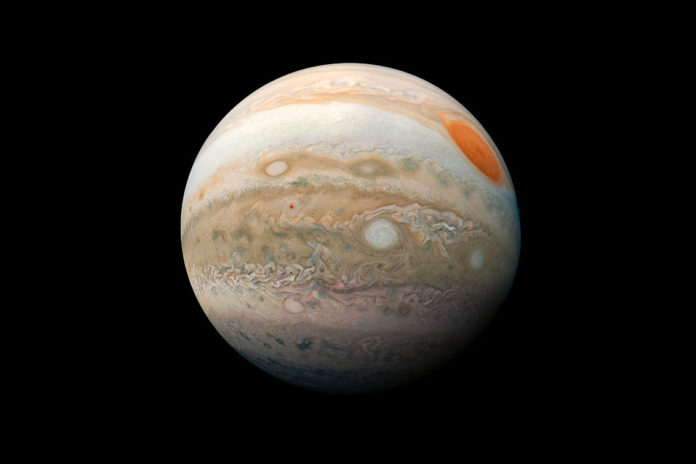Jupiter is the fifth planet from the sun. It lies in the outer half of the solar system. Named after the king of the Roman gods, it is also the largest planet. The outer planets of Jupiter, Saturn, Neptune and Uranus are all gas giants. Jupiter has 79 known satellites.
After Venus, the planet is the second brightest planet in the night sky. A Great Red Spot is its most distinguishing feature. The Spot is a huge storm on Jupiter’s surface. The gas giant has a faint ring made of dust particles. The planet has at least 79 known satellites. The four largest satellites are known as Galilean moons.
Surface of Jupiter
Atmosphere: Jupiter is a giant ball of gas with no solid body. The atmosphere is mostly hydrogen (90%) and helium (10%). Clouds made up of ammonia crystals cover Jupiter.
Great Red Spot: The Red Spot is its famous feature in the southern half of the planet. The Great Red Spot is an ongoing storm. This storm has been observed since the 1800’s.
A Protector: Jupiter’s large size and gravitational pull protects the inner planets. Gravity attracts many objects entering the solar system. As a result, these objects collide with Jupiter rather than reaching the inner planets.
Life: Most scientists don’t believe that there is life on Jupiter. However, some scientists believe that water may exist on some of the planet’s satellites. That water is underground and could possibly sustain life.
Facts About Jupiter
| PROPERTIES | MEASUREMENTS |
|---|---|
| Distance from the sun | 816 million kilometers (aphelion), 741 million kilometers (perihelion). |
| Size | radius of 71.5 thousand kilometers. |
| Mass | 318% of earth. |
| Gravity | 258% of earth. |
| Satellites | 79 satellites (Galilean moons: Io, Europa, Ganymede, Callisto). |
| Rotation | 10 hours (length of a day). |
| Revolution | 4,333 days (time to orbit the sun). |
| Surface Temperatures | 165 °K. |
Reflections
Vocabulary
Notes
- Jupiter is the fifth planet from the sun.
- It is the largest planet and possesses 79 satellites.
- Life could possibly exist in the underground oceans of one of the planet’s satellites.

